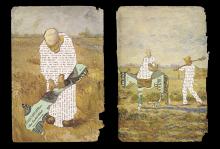debt forgiveness

IN A JUST ECONOMY, everyone who wants a job has one, and it pays a living wage, sufficient for workers and their families to thrive. Everyone’s material needs — for nutritious food, safe and secure housing, transportation, clothing, utilities, education, health care, and economic security — are met. Economists call this full employment in living wage jobs, and it is a goal of many justice advocates. It is also God’s vision for society.
Jesus told the disciples that he came so all may have abundant life (John 10:10). As Jesus showed, God’s vision encompasses more than abundant spiritual life. Jesus understood that God’s vision of abundance encompasses material needs as well as spiritual ones. Jesus healed broken bodies. He fed hungry people and encouraged others to do so as well. In God’s reign, everyone’s material needs are filled. But how does God envision this to happen?
The Old and New Testaments reveal a great deal about God’s intentions for the economy, the word we use to describe the way in which we use God-given natural resources — soil, rain, sun, fuels, minerals, trees, etc. — in combination with human effort and ingenuity (also given by God) to produce all our goods and services. We can gain important insights relevant to our economy today by examining the economic circumstances of the Israelites during three different biblical eras and then exploring what the biblical writers and Jesus taught about the economy and economic injustices during those periods.
Over the more than 10 centuries during which the biblical narrative was composed, the economic circumstances of the Israelites changed markedly and, in response, so did the economic instructions in the Bible. But, surprisingly, in each of the three eras, the instructions called for livelihoods for all that enabled thriving or, in our language today, full employment in living wage jobs.
In the Old Testament — the Hebrew Bible — the economic instructions are part of the laws found in Exodus, Leviticus, and Deuteronomy. Today, Christians often insufficiently value this body of law. Some of it seems strange to our modern ears. Other provisions fall far short of current standards for justice — for example, slavery and patriarchy were normalized then. Certainly some of our laws today will fall short of more enlightened future standards. But as we will see below, the law contains much timeless wisdom. To the Israelites, the law was a gift from God, a blessing, a guide to more joyful and fulfilling lives lived in right relationship with God. Psalm 23, one of the most beloved and well-known biblical psalms, tells of the comfort derived from God-the-Shepherd’s rod and staff, tools used to guide sheep in safe, life-giving paths. If we are open to it, we can gain important insights from the ancient laws.

In Leviticus 25, God instructs Moses and the people of Israel to institute a year of Jubilee. Every 50 years, at the blast of a trumpet, the Jubilee would mark a moral and economic shift in society: Slaves were set free, land was returned to its original owners, and any outstanding debts were eliminated (25:1-12). Similarly, in Deuteronomy 15, God says that every seven years, creditors should “remit the claim that is held against a neighbor” because “the Lord’s remission has been proclaimed.” In the New Testament, Jesus instructs his followers to pray “forgive us our debts, as we also have forgiven our debtors” (Matthew 6:12, Luke 11:4). Scripture is clear when it comes to debt abolition and the freeing of the debtor: God demands a society that delivers justice and freedom to all and rejects a society that physically and rhetorically shackles its people.

First Presbyterian, a congregation in the Presbyterian Church (USA) denomination, is one of many across the country raising money through the nonprofit RIP Medical Debt to buy and forgive medical debts owed by people who can’t afford to pay them back. The church hopes to raise $50,000 as one of two mission components to its capital campaign — enough to forgive $5 million in medical debt.

During my time in college and graduate school, I accumulated something like $50,000 in debt. So, you’d imagine I would be particularly excited about the prospect of Biden forgiving some of my debt. But I already paid off my student loans! Does that mean I rue others getting theirs forgiven? No! I am happy that other people may receive debt forgiveness even if it doesn’t apply to me.

[John Howard] Yoder suggests that texts such as “Do not be anxious” may be given in the context of the fallow year and that the prayer “Forgive us our debts as we forgive our debtors” should be interpreted far more literally than has usually been the case in praying our Lord’s prayer.

The Department of Education will forgive the federal loans of thousands of students who attended Corinthian Colleges, Secretary of Education Arne Duncan announced Monday.
Corinthian, a large for-profit education company, last month filed for bankruptcy amid multiple charges of fraud.
Duncan explained the move as an attempt to counter "the ethics of payday lending," according to the New York Times.
But the announcement is proving divisive, with critics citing the potentially huge taxpayer burden — the cost to the government could amount to as much as $3.5 billion if every former Corinthian student applies for relief.
Supporters, on the other hand, are hailing the move as a compassionate stance for students in unexpected need.
The New York Times reports:
“A lot of men and women have been hurt by this unfortunate situation, including low-income and minority students,” said a joint statement from Representative John Kline, the Minnesota Republican who is head of the Education and Workforce Committee, and Representative Robert C. Scott, Democrat of Virginia, the ranking minority member.
“Helping those eligible students who have been harmed is the right thing to do,” the statement said.
Mr. Duncan also said the department planned to develop a process to allow any student — whether from Corinthian or elsewhere — to be forgiven their loans if they had been defrauded by their colleges.
Read more here.

When confronted with the uncomfortable presence of so many relegated to the social margins of our society, we tend to shrink inward lest the enormity of life’s injustices overwhelm us. When we hear of another shooting, we heighten our vigilance with our own kids. We do not allow them to take public transportation. We drop them off and pick them up with little time for them to wait aimlessly. We fill their days with activities we can monitor. We are overwhelmed. Sadly, we turn our backs on the child whose parents are absent or on the community conditions that allow the crime to continue. When we see a disheveled, animated person, we bristle, avert our eyes, rehearse our, “I don’t have any money to give you today” response, or redirect our path to avoid them altogether. We are overwhelmed by social displacement. We do not know how to fix what is wrong. We feel inadequate. We experience dis-ease. But what if our overwhelmed, seemingly insignificant, and certainly inconvenient act is the very thing that will preserve life?
As the Pharaoh’s second in command in charge of administering the empire’s grain silos during the famine, Joseph preserved life long before his brothers appeared before him. As the dream-interpreting, forward-planning Vizier of Egypt, Joseph had already saved the lives of many—the entire Egyptian community and all those who travelled there seeking relief from the famine in the land.
Though his act of providing for his family seems magnanimous and extreme, as the Pharaoh’s senior administrator, Joseph had the weight of the entire empire at his command. Relocating his family from impoverished Canaan to resource-rich Egypt was an important thing, but it was a small thing. Sometimes a relatively small thing preserves life. Sometimes preserving life is the change in your pocket, the attentive eye contact that assures another that you see and value their humanity, or the willingness to help another find the help they need. Preserving life may mean giving more than the change in your pocket, changing laws that devalue the humanity of others or leveraging your privilege to connect those who need care with care-givers. All to preserve the life of many.

GOOD.is reports that some lucky customers of France’s oldest bank have had their loans forgiven, in a gesture that marked the Crédit Municipal de Paris’s 375th anniversary (or is that anniversaire?) The bank has a history of looking out for its customers and was in fact founded (in 1637) as a bank that would give “the needy access to fair banking” — something that was certainly not commonplace in the 17th Century.